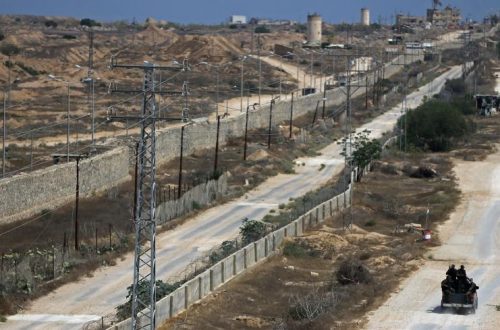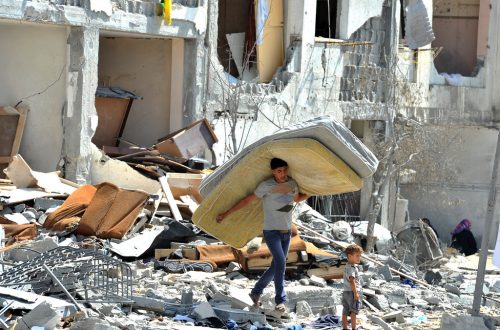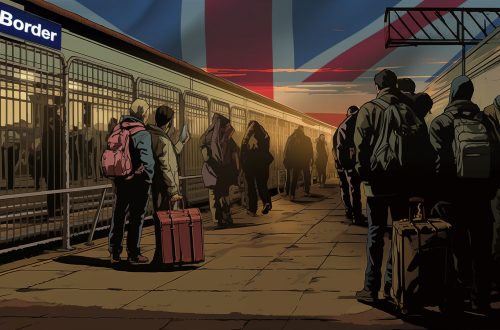This is a Cross-Post from Point of No Return
The announcement that direct talks are set to resume next week between Israel and the Palestinian Authority has set off a volley of the usual articles in the world’s press, branding the settlements and Israeli intransigence as the main obstacles to peace.
Sol Stern, a fellow at the Manhattan Institute think tank, is one of the few to warn that the talks are doomed before they start. Hard on the heels of his acclaimed piece, the Nakba obsession, he nails the real issue for the benefit of Jerusalem Post readers: the talks are doomed to flounder on the Palestinian ‘right of return’ – the demand to flood Israel proper with the millions of descendants of Palestinian refugees who left their homes in 1948.
The very notion of Palestinian refugees is “a great hoax” as far as he is concerned.
“Why are there refugees 62 years after the creation of the State of Israel,” he asks. “If a baby is born today in the Balata refugee camp that baby is called a refugee. The very notion is absurd.
“There can’t be peace until some Palestinian leader is willing to go to the camps and say, in effect, ‘We’ve lied to you for 60 years and you’re not going back.’”
But Stern sees no Palestinian leader willing to take that step, certainly not PA President Mahmoud Abbas, who he says scuttled the last round of direct talks in 2008 with then prime minister Ehud Olmert despite receiving an offer that would have given him 98 percent of the West Bank.
“I believe that Abbas knew that at that point he would have to go to the refugee camps and say to the refugees in Balata, ‘You are not going back to Jaffa; you’ll get compensation, you can build a house, but you are not going back to Jaffa.’ They [the Palestinians] are trapped by their own propaganda and their own ideology.”(…)
The refugee issue is one that Stern says Israel needs to place more of an emphasis on in its public diplomacy efforts. He would, he says, challenge the international human rights community over the refugees. “I would say if you really care about human rights, what about the human rights of the refugees who have been locked up for 62 years. They’re not going back; no reasonable person thinks they are going back, so why don’t we start dealing with it now? Why aren’t they offered money to build a home outside of the Balata refugee camp? What would be wrong with that?”
Stern suggests taking a leaf out of the history books and running – in the style of the Emergency Committee to Save the Jews of Europe – some full page ads in The New York Times with a picture of a baby born last week in Balata and asking: “Why is this poor baby a refugee 62 years after the 1948 war?”
“In my view,” says Stern, “this is something that is very important to focus on. It’s not just background noise.
It’s right at the heart of the problem.”
But Sol Stern should have gone further. He should have drawn a parallel between Palestinian refugees, who are denied citizenship in every Arab state except Jordan, and Jewish refugees, a model of absorption and integration in Israel and the West. There were more Jews driven out of Arab countries than Palestinians who fled Israel, and they lost 50 percent more in assets, but Israeli public diplomacy has been criminally negligent in failing to put their case.
For too long the Arab refugees have hogged the limelight in the Arab-Israeli drama. They are seen as the main victims of an Israeli injustice. By introducing the Jewish refugees into the equation – they and their descendants constitute just under half the Jewish population of Israel – it ought to be accepted that there were two sets of refugees, roughly equal in number, both with rights, who exchanged places in the Middle East.
Some people will say, why not also give the Jewish refugees a ‘right of return’ to Arab states ? Firstly, there is no precedent for such a return, nor is it enshrined in international law. The seven million Hindus and Muslims who swapped places in the Indian-Pakistani war of 1947 constituted a permanent exchange. So did the Greeks expelled from Turkey and Turks driven from Greece after the end of the First World War.
Secondly, apart from the chaos and turmoil generated by a mass population movement of this type, giving Jews a ‘right of return’ to countries which spat out them out is like asking a prisoner who has tasted freedom to go back to jail. Three generations have now been resettled in Israel and the West after their painful uprooting. They have have lost most of their their cultural and linguistic links with the Arab world. No Jew wishes to return to an Arab country, except perhaps as a tourist. These lands are not friendly, nor are they safe for Jews. The last of the Jews of Yemen are fleeing – a 3,000 -year old community is coming to an end. Even in lands of apparent stability, things can change overnight. In Morocco, the remaining 3,000 Jews likely have their suitcases ready-packed in case of sudden regime change.
Both Palestinian and Jewish refugees must be treated symmetrically. One can’t give ‘a right of return’ to one set and not to the other, or impose such a ‘right’ against their will. The logical alternative is no ‘right of return’ for either. Compensation, not return, has to be the answer.
Humanitarianism and common sense dictate that both sets of refugees should pursue the path of integration. Last week’s Lebanese decision to give Palestinians the right to work, except in the professions, was a baby step towards the resolution of the refugee problem through integration.
So if the next round of talks is not to be scuppered – let the parties get down to the nitty-gritty: let them discuss refugees, both Arab and Jewish.


